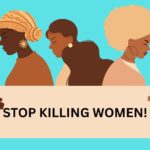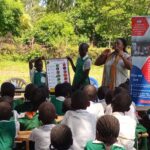
SGBV: Advancing Women Rights in Kenya
The International day for the Elimination of Violence against Women is celebrated annually on 25th November led by the United Nations Women with the aim of preventing and eliminating all forms of violence against women including Sexual and Gender Based Violence (SGBV).
This is followed by the 16 days of activism against gender violence commemorated each year around the world, where individuals and groups are provided a chance to mobilize and call attention to the urgent need to end violence against women and girls.
The global theme for this year is “Orange the World: Fund, Respond, Prevent, Collect!”
The 2010 Kenyan Constitution provides that every person has the right to freedom and security and recognizes all international treaties ratified by Kenya, including the UN Declaration on the Elimination of Violence against Women.
In Kenya, several laws address violence against women, including the Matrimonial Causes Act, Sexual Offences Act, Protection against Domestic Violence Act and Prohibition of Female Genital Mutilation Act; all of which are contained in the Constitution of Kenya’s Penal Code.
Sexual and Gender Based Violence (SGBV). What is It?
Sexual and gender based violence, also referred to as SGBV, are forms of unlawful and violent acts perpetrated against mostly women and girls. These acts of abuse can be sexual, emotional, physical or psychological.
In 2014, Kenya adopted the National Guidelines on the management of sexual violence, providing a framework for the provision of services to Sexual and Gender Based Violence (SGBV) survivors. Some counties have even gone a step further and domesticated their own SGBV policies.
However, more needs to be done to ensure this policies are prioritized in the budgets to ensure their full implementation. Notwithstanding these positive developments, SGBV remains prevalent.
The 2014 Kenya Demographic Health Survey shows that 45% of women at the national level in Kenya, aged 15-49 have experienced either physical or sexual violence. Many violence cases are not reported to authorities and few women get justice or receive medical care.
According to the World Health Organization, violence against women remains a major global public health and women’s health threat during emergencies. Early marriages, sexual harassment, rape and Female Genital Mutilation are some of the worrying concerns for women during public health emergencies and pandemics.
A study by the Kenya National Bureau of Statistics showed that 23.6% of Kenyans have witnessed or heard cases of domestic violence in their communities since the introduction of COVID-19 containment measures.
Lockdowns to curb the spread of the new coronavirus have fueled an upsurge in gender-based violence across the world, with women and girls more isolated and vulnerable to physical and sexual abuse and exploitation.
For instance, the national GBV Hotline 1195 received 810 cases in September (as of 29 September 2020) compared to 646 cases in August, an increase of 25%.
These increase in reported cases of GBV since the start of COVID-19 was driven by several factors including financial hardship due to restriction of movement and curfew affects livelihoods, especially for those working in the informal sector.
It is believed that confinement at home, under heightened levels of stress, uncertainty and fear, produced a stressful environment that precipitated violence.
The gaps in violence prevention and response existed in Kenya before COVID-19. This crisis has magnified the gaps as resources and access to services become more strained.
Gaps in the processes and systems handling prevention and tackling Gender Based Violence as well as in reporting, case management, responses, prosecution and men involvement remain a hindrance.
In order to eliminate or prevent SGBV, the Kenya National Policy for Prevention and Response to GBV outlined factors that need to be considered some of which include;
- Fast-track dissemination and implementation of minimum standards for service delivery across sectors and enhance comprehensive care and support for survivors, perpetrators and their families in all government facilities (health, legal, social) including emergency situations.
- Strengthen capacity of institutions and service providers handling GBV across the health and social sectors and the criminal justice system.
- Strengthen communication and the referral mechanism on GBV response interventions within and across sectors.
- Public engagement by identifying male champions to promote respectful relationships and encourage others to refrain from violence.
- Development of GBV guidelines by the Ministry of Health that are effective during public health emergencies.
- Establishment of Gender desks at public service centers across the country with at least two officers with in-depth knowledge of violence laws assigned to cases of violence against women and girls.
- Create laws and enforce existing laws that protect women from discrimination and violence, including rape, beatings, verbal abuse, mutilation, torture and trafficking.
Violence against women continues to be an obstacle to achieving equality, development, peace as well as to the fulfillment of women and girls’ human rights.
All in all, the promise of the Sustainable Development Goals (SDGs), ‘to leave no one behind’ cannot be fulfilled without putting an end to violence against women and girls.
It is critical to invest in prevention strategies and in changing the structures and systems that perpetuate gender inequality and discrimination, as the root cause.
The only way we can protect the right to freedom from violence is by adopting a common and multifaceted approach.
The international community should take note of the surge in violence against women and support the mobilization of resources that aid in prevention and management of SGBV, the local governments to strengthen protection mechanisms including full implementation of SGBV and other policies that protect the right and dignity of women and girls; and citizens to take action to reduce human rights abuses and eliminate acts of violence in their communities.
Together we can prevent this vice from becoming a human rights epidemic by each playing our role!



